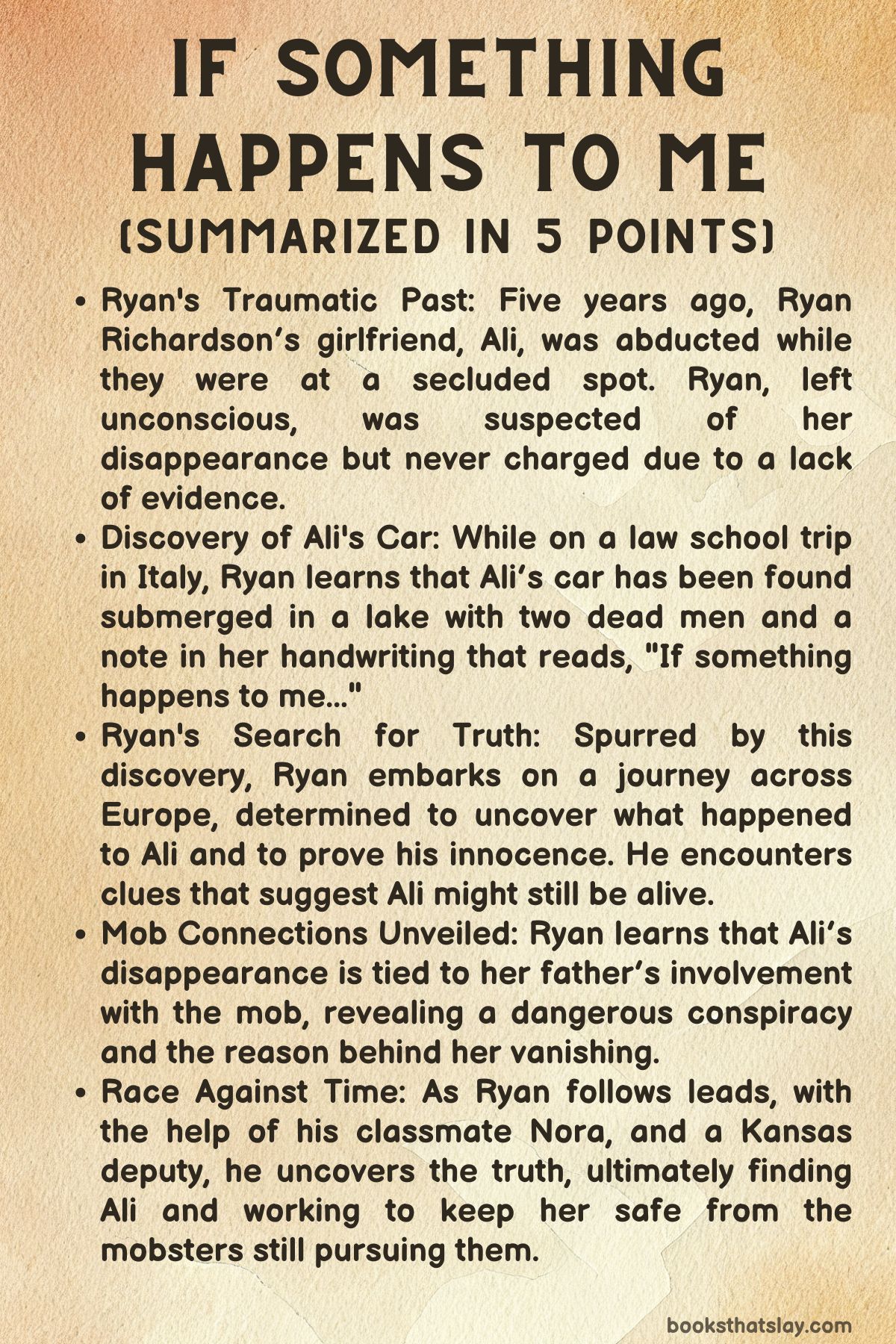If Something Happens to Me Summary, Characters and Themes
If Something Happens to Me by Alex Finlay is a gripping thriller that weaves together mystery, suspense, and complex characters. The story centers on Ryan Richardson, who has been haunted by the disappearance of his high school sweetheart, Ali, for five years.
Though Ryan was suspected of foul play, no evidence ever surfaced—until Ali’s car is found submerged in a lake with two dead men inside and a note in Ali’s handwriting that reads, “If something happens to me…” As Ryan embarks on a harrowing quest across Europe to uncover the truth, he must confront past traumas, cryptic puzzles, and dangerous enemies in this pulse-pounding journey.
Summary
The novel begins with Ryan Richardson and his high school girlfriend, Ali, heading to a secluded spot for a picnic. Suddenly, their lives take a terrifying turn when a mysterious vehicle appears, and Ali is abducted. Ryan is left unconscious from a blow to the head, and from that moment on, Ali and the car vanish without a trace.
The community and law enforcement suspect Ryan’s involvement, but there is no solid proof, allowing him to evade formal charges. Despite the suspicions, Ryan’s life is shattered, and the stain of being viewed as a possible murderer follows him.
Years later, while on a trip to Italy with his law school classmates, Ryan receives shocking news: Ali’s car has been found submerged in a lake in his hometown. Inside the vehicle are the bodies of two men and a cryptic note written in Ali’s handwriting, saying, “If something happens to me.”
This discovery rekindles the mystery surrounding Ali’s disappearance, forcing Ryan to confront the trauma of that night all over again. Soon after, Ryan sees a man with a distinct physical feature—a missing pinky—whom he remembers from his fragmented memories of the abduction.
Driven by the possibility that Ali might still be alive, Ryan embarks on a dangerous journey across Europe. From the hills of Tuscany to a rural village in the UK, and later to the streets of Paris, Ryan is determined to uncover the truth.
Along the way, he encounters Nora, a classmate who supports him and helps him track down the missing pieces. Together, they use clues and technological tools, such as tracking devices, to follow leads and unravel the mystery.
As the story progresses, additional characters are introduced, including a Kansas sheriff’s deputy named Poppy and a mobster from Philadelphia. Their seemingly unrelated lives begin to intertwine with Ryan’s quest, revealing a deeper, more complex conspiracy tied to Ali’s disappearance.
It becomes clear that Ali’s abduction is linked to her father’s involvement with the mob and a dangerous chain of events that goes far beyond Ryan’s initial understanding.
In a series of twists, Ryan discovers that Ali had been living under a new identity, hiding from her past and the dangerous figures connected to her father’s mob ties. As the puzzle pieces fall into place, Ryan not only seeks to clear his name but also to reunite with Ali and protect her from the dangers that still loom.
The novel’s pace quickens as it reaches its climax, with Ryan and Ali returning to the U.S., where they must navigate the treacherous path of working with the FBI and staying safe from the criminals hunting them.
The narrative is full of action, mystery, and unexpected twists, as Ryan fights to uncover the truth and gain redemption for himself and Ali.

Characters
Ryan Richardson
Ryan is the central character whose life is defined by the traumatic event of his girlfriend Ali’s abduction. The incident leaves him haunted, socially isolated, and wrongfully perceived as guilty by his community.
For years, Ryan endures public suspicion and harassment, which follow him even as he changes his name and attempts to start anew in law school. His sense of guilt and obsession with proving his innocence is palpable throughout the novel.
Ryan’s character is complex—torn between hope and despair, deeply affected by his unresolved trauma but driven by a relentless need to uncover the truth about what happened to Ali. His vulnerability makes him a sympathetic figure, even as he remains cautious and guarded in his interactions, particularly with people like Nora, a classmate who tries to support him.
The discovery of Ali’s car in the lake, along with two dead bodies, forces Ryan back into a nightmare he has been trying to escape for years. Despite the potential danger, Ryan shows determination and resilience, embarking on a transcontinental journey to track down answers.
His encounters with the man who abducted Ali reignite memories and sharpen his resolve, pushing him toward confronting the dark forces behind her disappearance. Ryan’s narrative arc focuses on his quest for redemption and the unraveling of a much deeper conspiracy tied to organized crime and familial secrets.
Ali (Allison)
Ali is the catalyst for much of the novel’s mystery, though her presence is initially shrouded by her disappearance. As Ryan’s high school sweetheart, she represents both love and loss in his life.
Her sudden abduction leaves her fate unknown for years, making her a tragic figure whose absence haunts Ryan and the entire narrative. However, as the story progresses, it’s revealed that Ali has been living under a new identity, hiding from her past and the dangerous criminal connections of her family.
This reveal complicates her character, showing that she is more than a victim—she’s a survivor. Her involvement with her father’s mob ties adds layers to her personality.
Ali’s choices, such as leaving a cryptic note—“If something happens to me”—reveal her intelligence and foresight. She is resourceful and brave, having lived on the run, aware of the dangers surrounding her.
By the end of the novel, Ali emerges not just as someone who needs rescuing, but as a central figure in the conspiracy that drives the plot. She actively works with Ryan to find a way to outwit their pursuers.
Nora
Nora is a law school classmate of Ryan’s, and while she doesn’t have a large role in his life initially, she becomes increasingly important as the novel progresses. Her relationship with Ryan is complicated—she clearly cares for him, but he remains emotionally distant due to the trauma of Ali’s disappearance.
Nora’s persistence and willingness to help Ryan shows her loyalty and strength of character. Even when she’s aware that Ryan may not be able to reciprocate her feelings fully, she stays by his side.
Nora takes on an investigative role alongside Ryan, demonstrating resourcefulness and initiative. Her decision to plant a tracking device on Ryan’s car, despite his initial reluctance, reflects her protective instincts and ability to think critically.
Nora’s role is essential in helping Ryan track down key leads. She provides the support he needs to pursue the truth, even as the stakes rise.
Poppy (Kansas Sheriff’s Deputy)
Poppy is introduced as a young sheriff’s deputy in Kansas who is new to law enforcement but determined to make a name for herself. Her involvement in the case is initially peripheral, but her role grows as the investigation into the car found in the lake and Ali’s disappearance begins to intersect with Ryan’s story.
Poppy’s character is that of a diligent, dedicated officer who, despite her inexperience, is eager to prove herself capable of handling complex and high-stakes situations. As Poppy uncovers more details about the car, she begins to untangle the threads that connect the local mystery to a much larger criminal enterprise.
Her tenacity and willingness to follow leads, even when they seem improbable or dangerous, make her a key figure in the resolution of the mystery. While her character may seem secondary at first, she plays a crucial role in connecting various plotlines, adding depth to the law enforcement perspective of the novel.
Shane and Gina (Philadelphia Mob Connection)
Shane and his wife Gina represent the more sinister side of the novel, with their connection to the Philadelphia mob and organized crime playing a significant role in the plot. Shane’s role as an accountant who works for the mob places him in a precarious position.
Though initially appearing to be involved in a separate storyline, Shane’s character is eventually revealed to have deep ties to Ali’s disappearance and her family’s criminal connections. Shane is portrayed as a man who has long been caught up in the web of mob dealings, setting up offshore accounts and managing illicit finances.
His disillusionment with the life he has been forced to lead is evident. His attempts to distance himself from the mob create tension throughout the novel.
Shane’s awareness of the consequences of betraying the mob makes his decisions fraught with danger. His story adds a layer of intrigue and tension to the broader mystery.
Gina, though not as developed as Shane, represents the emotional toll that this dangerous lifestyle takes on families. She serves as a reminder of the personal sacrifices and risks involved in the world of organized crime.
Ali’s Father (Mob Involvement)
Ali’s father is a key figure in the novel’s backstory, responsible for the dangerous situation that Ali finds herself in. His involvement with the mob provides the foundational conflict that leads to Ali’s disappearance.
Once a trusted member of the mob, Ali’s father finds himself trapped in a life of criminal dealings after his wife’s actions tie him deeper into the organization. His decision to escape the mob with Ali is the catalyst for much of the danger they face, as he becomes a target after defying the mob and embezzling funds.
Though he is not present for much of the novel, Ali’s father’s actions cast a long shadow over the story. His decisions not only endangered Ali but also set the entire conspiracy in motion, linking his family to dangerous criminal figures that have pursued them across years and continents.
Themes
Trauma, Memory, and the Persistence of the Past
One of the central themes in If Something Happens to Me is the exploration of trauma, its lasting effects on memory, and how the past persists even when individuals attempt to move on. Ryan, the protagonist, is haunted by the violent abduction of his girlfriend Ali, and the suspicion that has surrounded him ever since.
Despite changing his name and pursuing a new life as a law student, the traumatic events of that night continue to shape his existence. His fragmented memory, particularly his inability to recall key details of the night due to being struck unconscious, reflects how trauma clouds perception and distorts reality.
Ryan’s hypnotherapy sessions, which reveal small, disturbing details like the missing pinky of the abductor, serve as a metaphor for how trauma resurfaces in incomplete, disjointed ways. This theme highlights how trauma is not a singular event but an ongoing condition that reshapes identity and continually interrupts any attempt at normalcy.
Ryan’s confrontation with his past, particularly when he sees the man from his nightmares, underscores the relentless persistence of traumatic memory and the inescapability of unresolved psychological wounds.
The Interplay Between Justice and Public Perception in a Digitized World
The novel delves into the complex relationship between justice, guilt, and the public’s perception in an era of constant digital scrutiny. Ryan’s life is overshadowed by the stigma of being a suspected murderer, despite the lack of evidence and his legal acquittal.
In a world where podcasts, internet forums, and social media platforms dissect criminal cases with little regard for nuance, Ryan finds himself trapped in a limbo where public opinion treats him as guilty regardless of the legal outcome. This theme underscores the disparity between official justice systems and the chaotic, uncontrollable force of public perception in the digital age.
The trolls and amateur sleuths who hound Ryan online are emblematic of how the internet has become a powerful yet reckless tool in shaping narratives of guilt or innocence. The novel critiques this phenomenon by portraying Ryan’s suffering, not just at the hands of law enforcement, but from a society that thrives on controversy and speculation.
His changing of his name and escape to a new life symbolize the modern individual’s need to distance themselves from the weight of online infamy. Yet the discovery of Ali’s car shows that digital or social condemnation can never fully erase the truth.
The Convergence of Personal Identity and Collective Secrets
Identity, both personal and collective, is another intricate theme in the novel. Ryan’s decision to reinvent himself by changing his last name reflects a desperate attempt to shed the identity imposed on him by his community and by the media.
Yet, Ryan’s identity crisis is mirrored on a broader level by Ali, who has been living under a new name after her abduction, entangled in her father’s criminal underworld. The theme of identity here is not just about individual self-perception but is deeply interwoven with collective histories and secrets.
Both Ryan and Ali are trapped by their connections to larger, hidden worlds—whether it be Ryan’s link to the unresolved crime or Ali’s ties to her father’s mob dealings. The novel suggests that personal identity cannot be separated from the web of relationships, histories, and deceptions in which one is enmeshed.
The journey that Ryan and Ali embark on is not merely a quest for survival but a deeper investigation into who they are beyond the roles imposed on them by circumstance.
The Fragility of Truth and the Manipulation of Narrative in Modern Thrillers
At its core, If Something Happens to Me explores the fragility of truth and the ease with which narratives can be manipulated in contemporary thrillers. The novel plays with the idea that truth is not a fixed, objective reality but something that can be distorted, hidden, or even actively misrepresented by various parties—whether by criminals, authorities, or even victims themselves.
The puzzle that Ali leaves behind, along with the cryptic message in her handwriting, serves as a symbol of how truth in the novel is elusive. Truth is something that must be pieced together from scattered fragments and misleading clues.
The frequent shifts in perspective, the involvement of multiple characters with seemingly unrelated stories, and the constant twists in the plot are thematic explorations of how truth is layered, multifaceted, and often deliberately obscured. The introduction of the mobster and the larger conspiracy adds another dimension, suggesting that truth can be suppressed or manipulated by powerful forces for personal gain.
Ultimately, the novel suggests that finding the truth requires not just perseverance but the willingness to confront uncomfortable realities. It requires accepting that the narrative one has clung to might be a distortion.
The Intersection of Crime, Power, and Familial Legacy
Another sophisticated theme in If Something Happens to Me is the exploration of crime as an inherited burden, particularly through the lens of familial legacy. Ali’s disappearance is not an isolated incident but part of a much larger, more complex web of organized crime, specifically tied to her father’s involvement with a powerful mobster.
This intergenerational connection to criminality serves as a comment on how individuals are often trapped by the legacies of their families. This is especially true when those families have ties to power structures that operate outside the law.
Ali’s father’s debt to the mob and the way it dictates her fate is emblematic of how power and crime perpetuate themselves across generations, binding children to the sins of their parents. This theme reflects how personal agency can be compromised by larger systems of power and control, particularly when those systems are criminal in nature.
It also brings into focus the moral complexities of loyalty, responsibility, and self-preservation—issues that Ali, her father, and even Ryan must grapple with as they navigate a dangerous world.
Redemption and the Desire for Exoneration Amidst Layers of Betrayal
The theme of redemption runs deeply throughout the novel, especially in Ryan’s journey to prove his innocence. His desperate need to exonerate himself is not just a legal pursuit but a psychological one—he seeks redemption in the eyes of his community, the law, and most importantly, in his own understanding of what happened to Ali.
The layers of betrayal that Ryan must navigate, from the suspicion of his town to the uncovering of Ali’s own deceptions about her identity, make his search for redemption all the more poignant. Ali, too, is seeking a form of redemption, not just for herself but for her father’s actions and the way they have shaped her life.
The novel portrays redemption as a complex, often incomplete process. It is something that is earned not through a singular heroic act but through confronting multiple betrayals, personal sacrifices, and a willingness to face the darker truths of one’s past.


